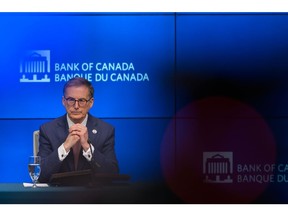
Article content
(Bloomberg) — Bank of Canada Governor Tiff Macklem reiterated that he sees inflation running hotter than expected, while saying employment appears to be holding up outside of trade-intensive sectors.
THIS CONTENT IS RESERVED FOR SUBSCRIBERS ONLY
Subscribe now to read the latest news in your city and across Canada.
- Exclusive articles from Barbara Shecter, Joe O'Connor, Gabriel Friedman, and others.
- Daily content from Financial Times, the world's leading global business publication.
- Unlimited online access to read articles from Financial Post, National Post and 15 news sites across Canada with one account.
- National Post ePaper, an electronic replica of the print edition to view on any device, share and comment on.
- Daily puzzles, including the New York Times Crossword.
SUBSCRIBE TO UNLOCK MORE ARTICLES
Subscribe now to read the latest news in your city and across Canada.
- Exclusive articles from Barbara Shecter, Joe O'Connor, Gabriel Friedman and others.
- Daily content from Financial Times, the world's leading global business publication.
- Unlimited online access to read articles from Financial Post, National Post and 15 news sites across Canada with one account.
- National Post ePaper, an electronic replica of the print edition to view on any device, share and comment on.
- Daily puzzles, including the New York Times Crossword.
REGISTER / SIGN IN TO UNLOCK MORE ARTICLES
Create an account or sign in to continue with your reading experience.
- Access articles from across Canada with one account.
- Share your thoughts and join the conversation in the comments.
- Enjoy additional articles per month.
- Get email updates from your favourite authors.
THIS ARTICLE IS FREE TO READ REGISTER TO UNLOCK.
Create an account or sign in to continue with your reading experience.
- Access articles from across Canada with one account
- Share your thoughts and join the conversation in the comments
- Enjoy additional articles per month
- Get email updates from your favourite authors
Sign In or Create an Account
or
Article content
In a wide-ranging speech on how the trade war is impacting the Canadian economy, Macklem flagged uncertainty about how tariffs and counter-tariffs may impact price pressures moving forward, repeating that “we can’t let a tariff problem become an inflation problem.”
Article content
Article content
Article content
Speaking in St. John’s, Newfoundland, Macklem pointed to core inflation gauges, including the bank’s preferred median and trim metrics, as suggesting underlying price pressures may be “firmer than we thought,” a major reason why the central bank held its policy rate at 2.75% earlier this month.
Article content
By signing up you consent to receive the above newsletter from Postmedia Network Inc.
Article content
Those two measures rose at a 3.2% yearly pace in April — the highest in over a year. He also pointed to headline inflation excluding taxes of 2.3%, which was “slightly stronger than the bank had expected.” The removal of the consumer carbon tax pushed down the overall headline rate to 1.7%.
Article content
Macklem said some of the run-up in core inflation is due to higher goods and food prices, which may be starting to see the impact of US President Donald Trump’s tariffs and Canada’s counter-measures.
Article content
The speech confirms the bank is increasingly seized by the recent run-up in core inflation, and may be reluctant to resume monetary easing without more clarity on its persistence. And while officials expect the economy to weaken, uncertainty about how tariffs could increase inflation remains a question mark.
Article content
Article content
Macklem warned that if inflation expectations are elevated, firms may more easily pass on the cost of tariffs because “people won’t be surprised to see higher prices.” Alternatively, if the economy slows and employment keeps weakening, falling demand could make it more difficult for firms to hike prices.
Article content
“If the current tariffs and counter-tariffs remain in place, past experience suggests pass through of about 75% of the costs of tariffs over roughly a year and a half,” Macklem said.
Article content
Macklem said the bank is already seeing the impact of tariffs on employment in trade-focused industries, but the broader labor market has held up so far. “We are watching closely for signs that weakness in the job market is broadening.”
Article content
While it’s still too early to see the direct effect of counter-tariffs in the inflation data, Macklem said the bank sees some indirect impacts from trade disruption. Businesses report higher costs as they search for other suppliers and new markets, he noted.
Article content
Diversification of trade adds “resilience,” Macklem said, and growing new markets for Canadian businesses limits vulnerabilities to trade barriers. He pointed to Newfoundland and Labrador’s oil exports to Europe as example, adding that only a third of the province’s goods exports are US-bound compared to three-quarters of Canada’s exports.
Article content
“We are proceeding carefully with monetary policy,” he said. “We want to see through the noise to set policy that supports the economy while ensuring inflation remains low and stable for Canadians.”
Article content

.jpg) 3 hours ago
1
3 hours ago
1
 English (US)
English (US)